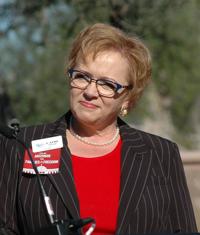PHOENIX — Abortion foes are making another bid for state tax dollars to fund private organizations that will urge women not to terminate their pregnancies.
Legislation approved Tuesday on a 5-4 margin by the Senate Appropriations Committee would set aside $1.5 million a year for a “family health pilot program.”
It would require the Arizona Department of Health Services to contract with a nonprofit organization to provide direct services and referrals to biological or adoptive parents of children younger than 2, including “unborn children.”
The bill, SB 1328, specifies that among the goals of the program is to “support childbirth as an alternative to abortion” and “promote family formation.”
A second provision of the same bill sets aside another $1.5 million a year for the Department of Economic Security to operate, or find someone to operate, a 2-1-1 statewide information and referral service.
The state used to fund that phone and online service until the recession. Lobbyist Don Isaacson said United Way has picked up the cost in the interim. He said it can afford live operators only four days a week, eight hours a day, however.
To get the funding restored, the legislation spells out that this service cannot include any information regarding abortion or referrals for abortions — or referrals for any other service if it is provided by an organization that pays for or provides coverage for abortions, regardless of whether that’s the information the caller is seeking.
Senate Majority Leader Rick Gray, R-Sun City, acknowledged that language has one purpose: to deny funds to Planned Parenthood.
Gray praised the family health pilot program and its stated goals. “I think it’s important to try to inform women, try to protect babies,” he said.
The legislation is a virtual carbon copy of what was pushed last year by the anti-abortion Center for Arizona Policy. It fell one vote short as two of the 17 Senate Republicans sided with the 13 Democrats and refused to support it.
Cathi Herrod, president of the center, was back on Tuesday to make another push, saying the aim is to find “ways we can lower the abortion rate.” One purpose is to ensure that pregnant women get referred to agencies that will urge them against abortion, she said.
That one-sided advice annoyed Tory Roberg, lobbyist for the Arizona Secular Coalition.
“This is money that’s going to fake health clinics,” she told lawmakers. She said pregnant women looking for answers will be referred only to “crisis pregnancy” agencies, many which have no medical doctors on staff, who will seek to convince women not to have an abortion. Roberg questioned the methods they use.
“This money will be used to shame women. It will be used to hurt women,” Roberg said. “It will be used to give women fewer choices in their health care.”
The one-sided approach did not bother Lori Gray, a Fountain Hills resident. She told lawmakers she had two abortions as a teen “mostly because I had no idea there were other options.”
Gray said she ended up at Planned Parenthood and, due to complications, now cannot have any children.
Lola Bovell, president of Planned Parenthood Advocates, said abortion is a constitutionally protected right and there is no reason to deny women information on how to exercise that right.
And she pointed out that Gray’s legislation, as worded, even would block a woman who wants some other service her organization provides, like mammography, from being referred to Planned Parenthood, even if it was the closest provider.
Herrod said that is in line with existing policy that precludes state dollars from funding not just abortions but any organization that performs or refers people for abortions on the grounds that it becomes a way of indirectly subsidizing the procedure.
Anyway, she said, there are more than 200 community health centers in Arizona: “A woman does not need to go to Planned Parenthood to have her health needs met.”
Tuesday’s committee vote does not guarantee this year’s effort will meet with any more success than the measure that failed last year.
Sen. Heather Carter, R-Phoenix, voted against the measure, as she did last year. Approval this year would require her or Sen. Kate Brophy McGee, R-Phoenix, to change their mind on a final roll-call vote on the Senate floor.




